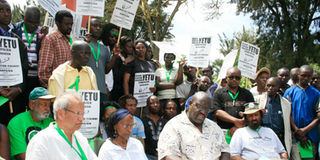New front opened in war on graft in Kenya

From left: Prof Yash Pal Ghai, Ms Gladwell Otieno, Mr John Githongo, Mr Davinder Lamba and other activists at Freedon Corner in Nairobi on January 9, 2011. They urged wananchi to demand the changes they voted for under the new Constitution. Photo/WILLIAM OERI
A new campaign was on Sunday launched to pressure the government to act on corruption and step up efforts to implement the Constitution.
Former Constitution of Kenya Review Commission chairman Yash Pal Ghai and former Ethics permanent secretary John Githongo joined hands in a new movement to urge Kenyans to push for the changes they envisioned when they voted for the new constitution in last year’s referendum.
The campaign dubbed “Kenya Yetu, Katiba Yetu, Maisha Yetu” is led by Mr Githongo, Prof Ghai, activist Davinder Lamba, former Transparency International local chapter boss Gladwell Otieno and International Commission of Jurists executive director George Kerogo.
“We have decided to come together in solidarity with the people who fight for this country,” said Prof Ghai.
He said the constitution offered a better life for Kenyans but Parliament and government were not doing enough to implement it.
“Promises regarding the constitution were made, but we have seen the government maintain in cabinet people who should be in jail,” he said.
He said ethnic lines that were deeply etched in Kenya’s history should be erased as were being used to propagate impunity.
The lobby group plans to involve private business in its campaign.
“We are hoping to create a grand coalition, not of the government, but of the people of Kenya because change will only come if the people take responsibility and work to achieve the goals of the constitution,” he said.
Citing Chapter Six of the Constitution which calls for leadership and integrity, the group called on the government to sack officials with corruption charges levelled against them both locally and internationally.
“We are not too excited by this ‘stepping aside’ business as we would be happier to see them feel the full wrath of the law and prosecuted,” said Mr Githongo.
The Anti-Corruption and Economics Crimes Act section 62 stipulates that once a public officer is charged with corruption or an economic crime, they shall be suspended at half pay with effect from the date of the charge.




